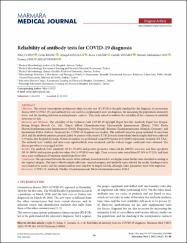| dc.description.abstract | Objective: The reverse transcription–polymerase chain reaction test (RT-PCR) is the gold standard for the diagnosis of coronavirus disease 2019 (COVID-19), and antibody tests are useful as supplemental tools for diagnosis, for measuring the population’s immunity levels, and for checking infection in asymptomatic contacts. This study aimed to evaluate the reliability of five commercial antibody detection test kits. Materials and Methods: The reliability of the Colloidal Gold COVID-19 IgG/IgM Rapid Test Kit, Antibody Rapid Test Hotgen, Beijing Hotgen Biotech Co., Ltd., China), Abbott Chemiluminescent Microparticle Immunoassay (Illinois, USA), Roche Electrochemiluminescence Immunoassay (Roche Diagnostics, Switzerland), Siemens Chemiluminescence (Munich, Germany), and Euroimmun ELISA (Lübeck, Germany) for COVID-19 diagnosis was studied. The antibody-negative group included 50 sera from 2018, and the antibody-positive group included 98 patients with positive RT-PCR results from whom blood samples had been collected 3–9 weeks after hospital discharge. Statistical analysis was performed using SPSS version 23.0 (IBM Corporation, Armonk, NY, USA). The antibody tests’ validity and intra-assay reproducibility were examined, and the Cohen’s kappa coefficients were obtained. The disease prevalence was pegged at 10%. Results: The antibody tests’ sensitivity (69.12–72.46%) and positive predictive values (42.44–100.0%) were low, and their specificity (89.58–100%) and negative predictive values (96.31–97.03%) were high. Their accuracy rates varied from 87.54% to 97.25%, and their intra-assay coefficients of variation varied from 1% to 10%. Conclusion: The agreement between the results of the antibody detection test kits was higher when the kits were classified according to the targeted antigens. The time of blood sample collection, targeted antigens, and antibody types affected the results. Serological tests were found to be useful, and the commercial kits were found to be largely reliable, although, some parameters need to be improved. | en_US |


















